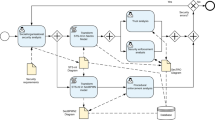Abstract
Ethical considerations in software requirements engineering are a critical but often overlooked aspect of the software development process. However, requests for transparency and autonomy in the way IT artefacts are designed, described, used, applied and integrated in the everyday life are getting more pressing within the society. In this research, the process of software engineering is taken as an illustrative model for the proactive incorporation of ethical principles in the system design within the design of a software artefact. Specifically, the phase of requirements elicitation and analysis are expanded with ethical aspects, since that is where the first steps of the software construction as an artefact are initiated and the first common ground of understanding is achieved. Being rooted in the security engineering, the SQUARE process is expanded to provide a basic structure for incorporating of ethical aspects into software design. By doing so, the social and moral values become central to the design and development of new technologies.
Access this chapter
Tax calculation will be finalised at checkout
Purchases are for personal use only
Similar content being viewed by others
References
Harrison, M.I., Koppel, R., Bar-Lev, S.: Unintended consequences of information technologies in health care—an interactive sociotechnical analysis. J. Am. Med. Inform. Assoc. 14(5), 542–549 (2007)
Majchrzak, A., Markus, M.L.: Methods for Policy Research: Taking Socially Responsible Action. SAGE Publications, Thousand Oaks, CA (2013)
Hein, A., Schreieck, M., Wiesche, M., Krcmar, H.: Multiple-case analysis on governance mechanisms of multi-sided platforms methods to master heterogeneity in IT service value networks. In: Mkwi, pp. 1613–1614 (2016)
Ann Majchrzak, M., Markus, L., Wareham, J.: Designing for digital transformation: Lessons for information systems research from the study of ICT and societal challenges. MIS Q. 40(2), 267–277 (2016). https://doi.org/10.25300/MISQ/2016/40:2.03
Mahieu, R., van Eck, N.J., van Putten, D., van den Hoven, J.: From dignity to security protocols: a scientometric analysis of digital ethics. Ethics Inf. Technol. 20(3), 175–187 (2018). https://doi.org/10.1007/s10676-018-9457-5
Baldini, G., Botterman, M., Neisse, R., Tallacchini, M.: Ethical design in the internet of things. Sci. Eng. Ethics 24(3), 905–925 (2018). https://doi.org/10.1007/s11948-016-9754-5
Myers, M., Venable, J.R.: A set of ethical principles for design science research in information systems. Manag. Past Present Future 51(6), 801–809 (2014). https://doi.org/10.1016/j.im.2014.01.002
Peffers, K., Tuunanen, T., Rothenberger, M.A., Chatterjee, S.: A design science research methodology for information systems research. J. Manag. Inf. Syst. 24(3), 45–77 (2007). https://doi.org/10.2753/MIS0742-1222240302
Beck, K.: Extreme Programming Explained. Addison-Wesley Professional (1999)
Kotonya, G., Sommerville, I.: Requirements engineering with viewpoints. Softw. Eng. J. 11(1), 5–18 (1996)
Mead, N.R.: System Quality Requirements Engineering (SQUARE) Process. Carnegie Mellon University (2013)
Collins, W.R., Miller, K.W., Spielman, B.J., Wherry, P.: How good is good enough?: an ethical analysis of software construction and use. Commun. ACM 37(1), 81–91 (1994). https://doi.org/10.1145/175222.175229
Mason, R.O.: Four ethical issues of the information age. Comput. Ethics 10, 41–48 (1986). https://doi.org/10.4324/9781315259697-8
Davis, M.: Part of: thinking like an engineer: the place of a code of ethics in the practice of a profession. Philos. Public Affair 20(2), 150–167 (1991)
Floridi, L.: Information ethics- On the philosophical foundation of computer ethics. Ethics Inf. Technol. 1, 37–56 (1999)
Friedman, A., Kahn, B., Borning, P.: Value Sensitive Design: Theory and Methods. University of Washington (2002)
Boehm, B.W.: Value-based software engineering: overview and agenda. In: Biffl, S., Aurum, A., Boehm, B., Erdogmus, H., Grünbacher, P. (eds.) Value-Based Software Engineering, pp. 3–14. Springer Berlin Heidelberg, Berlin, Heidelberg (2006). https://doi.org/10.1007/3-540-29263-2_1
Mingers, J., Walsham, G.: Towards ethical information systems: the contribution of discourse ethics. MIS Q. 34(4), 833–854 (2010)
J. Happa, J. Nurse, M. Goldsmith, S. Creese, und R. Williams, „An Ethics Framework for Research into Heterogeneous Systems“, 2018
Roberts, M.J., Reich, M.R.: Ethical analysis in public health. Lancet 359, 1055–1059 (2002). https://doi.org/10.1016/j.forpol.2009.07.003
Hartman, L.P.: Perspectives in Business Ethics. McGraw Hill (2005)
Donaldson, T., Preston, L.E.: The stakeholder theory of the corporation: concepts, evidence, and implications. Acad. Manage. Rev. 20(1), 65–91 (1995). https://doi.org/10.2307/258887
Strenge, B., Schack, T.: AWOSE - a process model for incorporating ethical analyses in agile systems engineering. Sci. Eng. Ethics 26(2), 851–870 (2020). https://doi.org/10.1007/s11948-019-00133-z
Aberkane, A.-J., Poels, G., Broucke, S.V.: Exploring automated GDPR-compliance in requirements engineering: a systematic mapping study. IEEE Access 9, 66542–66559 (2021). https://doi.org/10.1109/ACCESS.2021.3076921
Biable, S.E., Garcia, N.M., Midekso, D., Pombo, N.: Ethical issues in software requirements engineering. Software 1(1), 31–52 (2022). https://doi.org/10.3390/software1010003
Author information
Authors and Affiliations
Corresponding author
Editor information
Editors and Affiliations
Rights and permissions
Copyright information
© 2024 The Author(s), under exclusive license to Springer Nature Switzerland AG
About this paper
Cite this paper
Levina, O. (2024). Incorporating Ethical Aspects in Information Systems Requirements Engineering. In: Řepa, V., Matulevičius, R., Laurenzi, E. (eds) Perspectives in Business Informatics Research. BIR 2024. Lecture Notes in Business Information Processing, vol 529. Springer, Cham. https://doi.org/10.1007/978-3-031-71333-0_10
Download citation
DOI: https://doi.org/10.1007/978-3-031-71333-0_10
Published:
Publisher Name: Springer, Cham
Print ISBN: 978-3-031-71332-3
Online ISBN: 978-3-031-71333-0
eBook Packages: Computer ScienceComputer Science (R0)




